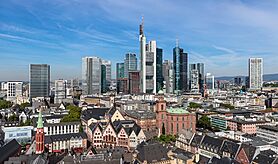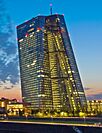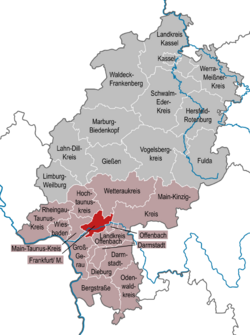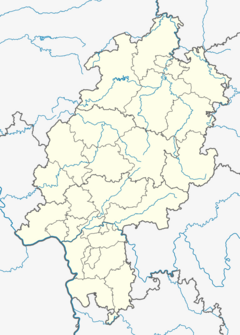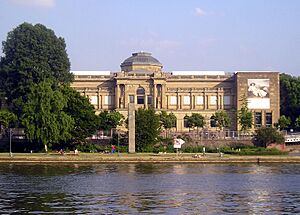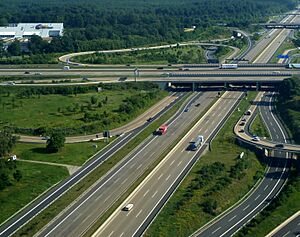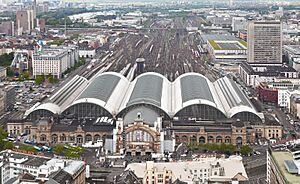Frankfurt facts for kids
Quick facts for kids
Frankfurt am Main
Frangford am Maa (Hessian)
|
|||
|---|---|---|---|
|
Frankfurt's skyline from Frankfurt Cathedral
Frankfurt Cathedral
European Central Bank
Römerberg
Alte Oper
|
|||
|
|||
| Country | Germany | ||
| State | Hesse | ||
| Admin. region | Darmstadt | ||
| District | Urban district | ||
| Founded | 1st century | ||
| Subdivisions | 16 area districts (Ortsbezirke) 46 city districts (Stadtteile) |
||
| Area | |||
| • City | 248.31 km2 (95.87 sq mi) | ||
| Elevation | 112 m (367 ft) | ||
| Population
(2022-12-31)
|
|||
| • City | 773,068 | ||
| • Density | 3,113.32/km2 (8,063.46/sq mi) | ||
| • Urban | 2,319,029 | ||
| • Metro | 5,604,523 | ||
| Time zone | UTC+01:00 (CET) | ||
| • Summer (DST) | UTC+02:00 (CEST) | ||
| Postal codes |
60306–60599, 65929–65936
|
||
| Dialling codes | 069, 06101, 06109 | ||
| Vehicle registration | F | ||
Frankfurt am Main (pronounced like FRANK-foort am MINE) is a very important city in Germany. It's the biggest city in the state of Hesse. About 773,000 people live here, making it the fifth-largest city in Germany.
Frankfurt is located on the Main River. Its name means "Frank's ford on the Main," referring to a shallow place where the ancient Frankish people could cross the river.
This city is a huge hub for business, culture, education, and travel. It's home to the European Central Bank, which is super important for the money used in many European countries. Frankfurt Airport is Germany's busiest airport and one of the busiest in the world. The city also has a famous stock exchange and hosts big trade fairs like the Frankfurt Book Fair, the largest book fair in the world.
Frankfurt is known for its amazing skyline with many tall skyscrapers, earning it the nickname Mainhattan (like Manhattan in New York City). The city is also very green, with lots of parks and a large city forest.
Frankfurt is a diverse city, with many people from different backgrounds living there. It's a place where old history meets modern life.
Contents
- Frankfurt's History: A Journey Through Time
- Frankfurt's Location and Layout
- People of Frankfurt
- Frankfurt's Economy and Business Life
- Frankfurt's Landmarks and Cityscape
- Culture and Fun in Frankfurt
- Getting Around Frankfurt
- Education and Research
- International Connections
- Cool Places to Visit Near Frankfurt
- See also
Frankfurt's History: A Journey Through Time
Frankfurt has a long and interesting history, going back to Roman times.
Early Days and the Holy Roman Empire
Long ago, in the Stone Age, there were settlements near Frankfurt. Later, the Roman Empire built a town called Nida here. Around 794 AD, the city was first mentioned as Franconofurd.
Frankfurt became one of the most important cities in the Holy Roman Empire. From 1562, the kings and emperors of the empire were elected and crowned right here in St. Bartholomäus Cathedral. This tradition continued for many years.
The first trade fair in Frankfurt was mentioned in 1150. These fairs became very important for trading goods. In 1372, Frankfurt became a "Free Imperial City," meaning it was directly under the emperor, not a local ruler. This gave the city a lot of freedom. In 1585, traders in Frankfurt even created a system for exchanging different currencies, which was an early step towards the Frankfurt Stock Exchange.
Changes and Challenges
After the French Revolution and during the time of Napoleon, Frankfurt was occupied by French troops. It lost its independence for a short time but became a free city again in 1815.
In 1848, Frankfurt was the meeting place for the first ever democratically elected German parliament, the Frankfurt Parliament. They met in St. Paul's Church to write a constitution for a united Germany. However, this attempt to unite Germany failed.
In 1866, Frankfurt lost its independence again when it was taken over by the Kingdom of Prussia. In 1914, the citizens of Frankfurt founded the University of Frankfurt, which is now one of Germany's largest universities.
World War II and Rebuilding
During World War II, Frankfurt was heavily bombed. Much of its beautiful old town was destroyed. Thousands of residents were killed. After the war, the city was rebuilt, but with a more modern style. Some important buildings, like the Römer and St. Paul's Church, were carefully rebuilt to look like they did before.
After the war, Frankfurt quickly became Germany's main financial center again. The Bank deutscher Länder, which was the start of the German central bank, was founded here in 1948. In 1998, the European Central Bank also chose Frankfurt as its home.
Frankfurt's Location and Layout
Frankfurt is located in the western part of Germany, on both sides of the Main River. To the south, you'll find the Frankfurt City Forest, which is Germany's largest city forest.
The city covers about 248 square kilometers. Its main downtown area is north of the Main River. Frankfurt is part of a larger area called the Frankfurt Rhine-Main Metropolitan Region, where over 5.5 million people live.
City Districts
Frankfurt is divided into 46 city districts. Some of these districts used to be separate towns that later became part of Frankfurt, like Höchst.
Frankfurt's Climate
Frankfurt has a mild climate. Winters are cool with rain, and summers are warm. It's one of the warmest and driest big cities in Germany. You might even see palm trees growing outside in a park called "Nizza" because of the warm local weather!
People of Frankfurt
Frankfurt is a very diverse city. In 2015, more than half of the people living in Frankfurt had a "migration background," meaning they or one of their parents were born in another country. About a quarter of the population are foreign nationals. This mix of cultures makes Frankfurt a truly global city, often compared to places like New York City or London.
Communities and Religions
Frankfurt has a large Moroccan community, with about 8,000 people. Many Moroccans came to Germany as guest workers in the 1970s.
Historically, Frankfurt was mainly a Protestant city. However, over time, more Catholics moved here. Today, both Catholicism and Protestantism are major Christian groups. Frankfurt also has a very old and important Jewish community, one of the largest in Germany. Due to immigration, there's also a significant Muslim community.
Frankfurt's Economy and Business Life
Frankfurt is a major player in the world of finance and business. It's often called Germany's financial capital.
Central Banks: Money Matters
Frankfurt is home to two very important banks:
- European Central Bank (ECB): This bank sets the money rules for all the countries in the Eurozone (countries that use the Euro currency). Its new headquarters in the Ostend district is a huge skyscraper.
- Deutsche Bundesbank: This is Germany's central bank. Before the Euro, it was in charge of Germany's currency, the Deutsche Mark.
Big Banks and the Stock Exchange
Many large banks have their main offices in Frankfurt, including Deutsche Bank, DZ Bank, and Commerzbank. This is why Frankfurt is sometimes nicknamed "Bankfurt."
The Frankfurt Stock Exchange is one of the biggest stock exchanges in the world. It's where shares of major German companies are bought and sold.
Trade Fairs: A Global Marketplace
Messe Frankfurt is one of the largest exhibition centers in the world. It hosts many huge trade fairs, including:
- Frankfurt Motor Show (IAA): The world's largest car show.
- Frankfurt Book Fair: The world's largest book fair.
- Ambiente Frankfurt: The world's largest consumer goods fair.
Frankfurt Airport: A Gateway to the World

Frankfurt Airport is one of the busiest airports globally. It's a massive workplace, with over 500 companies and more than 71,000 people working there. Lufthansa, Germany's main airline, uses Frankfurt as its primary hub.
Other Important Industries
Frankfurt is also home to companies in many other fields:
- Accountancy and Professional Services: Many big accounting and consulting firms have offices here.
- Law Firms: Frankfurt has the highest number of lawyers in Germany.
- Advertising Agencies: It's a media hub with many advertising and public relations companies.
- Food Industry: Companies like Nestlé and Ferrero SpA have German headquarters here.
- Automotive: Car manufacturers like Kia Motors and Fiat have European or German headquarters in Frankfurt.
- Chemical and Pharmaceutical: The Industriepark Höchst is one of Germany's largest industrial parks for these industries.
- Technology: DE-CIX in Frankfurt is the world's largest internet exchange point, which means a huge amount of internet traffic passes through here!
Frankfurt's Landmarks and Cityscape
Frankfurt has a mix of historic buildings and modern skyscrapers.
Historic Heart of the City
- Römer: This is Frankfurt's city hall, a group of nine old houses. The Kaisersaal (Emperor's Hall) inside was where newly crowned emperors held their banquets.
- Frankfurt Cathedral: This beautiful Gothic church was where German kings and emperors were elected and crowned for centuries. You can climb its tower for amazing views!
- St. Paul's Church: This church is a national historic monument because it hosted Germany's first democratically elected parliament in 1848.
- Eiserner Steg: The Iron Bridge is a pedestrian-only bridge over the Main River, connecting the old town with the Sachsenhausen district. It's a great spot for photos.
- Alte Oper: The "Old Opera" building was once a grand opera house. After being damaged in WWII, it was rebuilt and is now a famous concert hall.
- Eschenheimer Turm: This old tower from the 15th century was once a city gate and is one of the oldest buildings in the city center.
Modern Skyscrapers: Mainhattan

Frankfurt is famous for its many skyscrapers, earning it the nickname "Mainhattan." Most of these tall buildings are in the financial district. Some of the tallest include:
- Commerzbank Tower: One of the tallest buildings in the European Union.
- Messeturm: Another very tall skyscraper, located near the trade fair grounds.
- Main Tower: This skyscraper has an observation deck open to the public, offering fantastic views of the city.
- Seat of the European Central Bank: The headquarters of the ECB, a striking modern building.
Green Spaces: A City in Nature
Frankfurt is known as a "green city" because over half of its area is protected green space!
- Frankfurter Grüngürtel: This "Green Belt" is a ring of parks and natural areas around the city, including the huge Frankfurt City Forest.
- Mainuferpark: The beautiful green banks of the Main River are perfect for walking and enjoying the view.
- Palmengarten: A large botanical garden with many different plants, including tropical and subtropical ones in greenhouses.
Culture and Fun in Frankfurt
Frankfurt offers a lot to see and do, from museums to music and delicious food.
Museums: A River of Art and History
Frankfurt has over 30 museums, many of them located along the "Museumsufer" (Museum Embankment) on the banks of the Main River. Some popular museums include:
- Städel: One of Germany's most famous art museums.
- Senckenberg Natural History Museum: The second-largest natural history museum in Germany, with dinosaur skeletons and more!
- Deutsches Filmmuseum: The German Film Museum, where you can learn about movies.
- Goethe-Haus: The birthplace of the famous German writer Johann Wolfgang von Goethe.
Music and Entertainment
Frankfurt is known for its electronic music scene, especially Eurodance and Trance music, which started here in the late 1980s.
The city has many venues for concerts and shows:
- Oper Frankfurt: A leading opera company in Germany.
- Festhalle Frankfurt: A large hall used for concerts, exhibitions, and sports events.
- Deutsche Bank Park: Frankfurt's biggest sports stadium, home to the Eintracht Frankfurt football team.
Botanical Gardens
Frankfurt is home to two main botanical gardens:
- Palmengarten: A large and beautiful garden with plants from all over the world, including many palm trees.
- Botanischer Garten der Goethe-Universität: The university's botanical garden, with about 5,000 different plant species.
Festivals: Fun for Everyone
Frankfurt hosts many exciting festivals throughout the year:
- Museumsuferfest: A huge cultural festival along the Main River, with music, dance, and food.
- Dippemess: Frankfurt's oldest folk festival, like an amusement park with rides and traditional pottery.
- Luminale: A "festival of light" where many buildings are lit up with special designs.
- Wolkenkratzer Festival: The "Skyscraper Festival" where many skyscrapers open their doors to the public, with special shows and fireworks.
Delicious Food and Drinks
Frankfurt has its own special foods and drinks:
- Apfelwein: Also called "Ebbelwoi," this is a tart apple wine, often served in a special jug called a "Bembel."
- Grüne Soße: A green sauce made with seven fresh herbs, often served with boiled eggs and potatoes.
- Frankfurter Würstchen: Small smoked pork sausages, similar to hot dogs.
- Handkäs mit Musik: A strong-smelling cheese served with chopped onions.
Getting Around Frankfurt
Frankfurt has an excellent transportation system.
Airports: Flying In and Out
- Frankfurt Airport: This is the main airport, located southwest of downtown. It's a huge international hub.
- Frankfurt Hahn Airport: A smaller airport about 120 km away, used by low-cost airlines.
Roads: Autobahn Hub
Frankfurt is a major hub for Germany's famous Autobahn (motorway) system. The Frankfurter Kreuz is a very busy interchange where two major Autobahns meet.
Trains: Connecting the Region
- Frankfurt Central Station: This is Germany's largest railway station by train traffic. It's a huge hub for long-distance trains (like the fast ICE trains) and local trains.
- Frankfurt Airport Stations: The airport has two train stations, one for long-distance trains and one for local trains, making it easy to get to and from the airport.
Public Transport: Easy City Travel
Frankfurt has a great public transport system:
- S-Bahn: These nine suburban train lines connect Frankfurt with nearby towns.
- U-Bahn: These nine underground lines serve Frankfurt and its larger suburbs.
- Trams: Ten tram lines run above ground, offering more stops within the city.
- Buses: A network of bus lines completes the system, with night buses running when other services stop.
Bicycles and E-Scooters
You can also rent bicycles through services like Call a Bike and Nextbike. Frankfurt has special bike routes and "bicycle streets" to make cycling easier and safer. Since 2019, e-scooters are also available for rent in the city.
Education and Research
Frankfurt is a center for learning and new ideas.
Universities and Schools
- Johann Wolfgang Goethe University: The oldest and most famous university in Frankfurt.
- Frankfurt University of Applied Sciences: Offers many study areas in arts, sciences, engineering, and law.
- Frankfurt School of Finance & Management: A top business school.
- Städelschule: A famous art school.
- Frankfurt University of Music and Performing Arts: For students who want to study music.
Research Institutes
Frankfurt is home to several important research institutes, including three from the Max Planck Society, which do advanced research in areas like brain science and legal history. The Frankfurt Institute for Advanced Studies also conducts theoretical research in physics, neuroscience, and computer science.
International Connections
Frankfurt is a very international city and has many connections around the world.
Twin Towns and Friendly Cities
Frankfurt is "twinned" with many cities around the world, meaning they have special friendly relationships. These include:
- Birmingham, England
- Budapest, Hungary
- Lyon, France
- Milan, Italy
- Philadelphia, USA
- Tel Aviv, Israel
- Toronto, Canada
- Guangzhou, China
It also has friendly relations with Cairo, Egypt, and Yokohama, Japan.
Consulates
Because Frankfurt is so international, it hosts many diplomatic offices called consulates. The US Consulate General in Frankfurt is the largest American consulate anywhere in the world!
Cool Places to Visit Near Frankfurt
If you're in Frankfurt, there are many other interesting places to explore nearby:
To the North
- The Taunus mountains, great for hiking.
- Saalburg: An ancient Roman Empire army camp that's now a World Heritage Site.
- Bad Homburg vor der Höhe: A town with a famous casino.
To the West
- Wiesbaden: The capital of Hesse, with beautiful buildings and a casino.
- Mainz: Another historic city, also a World Heritage Site.
- The Rheingau wine region, known for its vineyards.
- The Rhine Gorge, a stunning part of the River Rhine that is a World Heritage Site.
To the South
- Darmstadt: Home to the Mathildenhöhe, an Art Nouveau World Heritage Site.
- The real Frankenstein Castle, which inspired the famous story!
- Heidelberg: A beautiful historic city with a famous castle.
See also
 In Spanish: Fráncfort del Meno para niños
In Spanish: Fráncfort del Meno para niños


